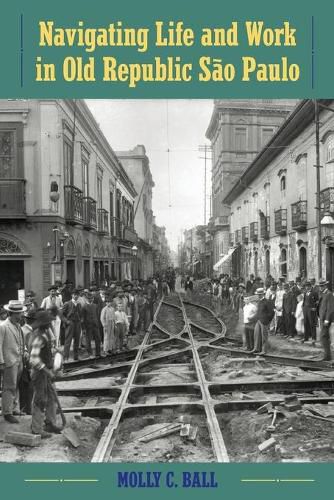Readings Newsletter
Become a Readings Member to make your shopping experience even easier.
Sign in or sign up for free!
You’re not far away from qualifying for FREE standard shipping within Australia
You’ve qualified for FREE standard shipping within Australia
The cart is loading…






This title is printed to order. This book may have been self-published. If so, we cannot guarantee the quality of the content. In the main most books will have gone through the editing process however some may not. We therefore suggest that you be aware of this before ordering this book. If in doubt check either the author or publisher’s details as we are unable to accept any returns unless they are faulty. Please contact us if you have any questions.
This volume examines the experiences of Sao Paulo’s working class during Brazil’s Old Republic (1891-1930), showing how individuals and families adapted to forces and events such as urbanization, discrimination, migration, and World War I. In this unique study, Ball combines social and economic methods to present a robust historical analysis of everyday life along racial, ethnic, national, and gender lines.Drawing from both statistical data and primary sources such as letters, newspapers, and interview transcripts, Ball demonstrates how the nation’s coffee boom drew immigrants from Italy, Portugal, Germany, Lebanon, and northeastern Brazil. She examines the ways these workers responded to inflation; fluctuating immigration patterns; and labor market discrimination, which especially affected Afro-Brazilians, Portuguese, and women. This analysis emphasizes the family-centered nature of immigration to Sao Paulo in comparison with other immigrant destinations such as Buenos Aires and New York City.
Ball’s rich scholarship considers how the first World War exacerbated tensions and divisions within Sao Paulo’s working class, which resulted in a deeply segmented labor market by the time Getulio Vargas came to power in 1930. Shedding light on many reasons why Brazil experienced slower industrial innovation than other countries during this era, Ball provides invaluable context for the region’s continued high inequality and sociocultural imbalances.
$9.00 standard shipping within Australia
FREE standard shipping within Australia for orders over $100.00
Express & International shipping calculated at checkout
This title is printed to order. This book may have been self-published. If so, we cannot guarantee the quality of the content. In the main most books will have gone through the editing process however some may not. We therefore suggest that you be aware of this before ordering this book. If in doubt check either the author or publisher’s details as we are unable to accept any returns unless they are faulty. Please contact us if you have any questions.
This volume examines the experiences of Sao Paulo’s working class during Brazil’s Old Republic (1891-1930), showing how individuals and families adapted to forces and events such as urbanization, discrimination, migration, and World War I. In this unique study, Ball combines social and economic methods to present a robust historical analysis of everyday life along racial, ethnic, national, and gender lines.Drawing from both statistical data and primary sources such as letters, newspapers, and interview transcripts, Ball demonstrates how the nation’s coffee boom drew immigrants from Italy, Portugal, Germany, Lebanon, and northeastern Brazil. She examines the ways these workers responded to inflation; fluctuating immigration patterns; and labor market discrimination, which especially affected Afro-Brazilians, Portuguese, and women. This analysis emphasizes the family-centered nature of immigration to Sao Paulo in comparison with other immigrant destinations such as Buenos Aires and New York City.
Ball’s rich scholarship considers how the first World War exacerbated tensions and divisions within Sao Paulo’s working class, which resulted in a deeply segmented labor market by the time Getulio Vargas came to power in 1930. Shedding light on many reasons why Brazil experienced slower industrial innovation than other countries during this era, Ball provides invaluable context for the region’s continued high inequality and sociocultural imbalances.